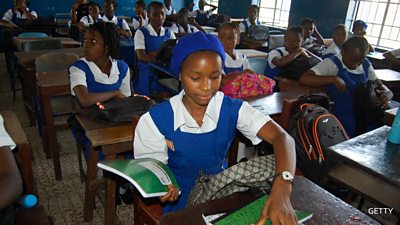Research summary
Published: July 2021
In Sierra Leone, girls are more likely than boys to drop out of school - or to never even attend school. They also have high rates of early marriage and early pregnancy. The Every Adolescent Girl Empowered and Resilient (EAGER) project, funded by the UKβs Foreign, Commonwealth and Development Office (FCDO), aims to empower girls aged 13β17 in Sierra Leone, who have never been to school or have dropped out. It helps them to acquire life skills and supports their transition into education, training, business or employment.
The project
As part of the EAGER project, ΒιΆΉΤΌΕΔ Media Action produces the weekly radio discussion programme Wae Gyal Pikin Tinap (When the Girl Child Stands). The programme has been broadcast across Sierra Leone in the Krio language since July 2020 and aims to challenge negative attitudes and practices that prevent adolescent girls from accessing, or remaining in, education, training or employment. The show covers diverse topics relating to girlsβ own experiences, focusing on ideas and solutions. A range of guest contributors share their experiences and their views with listeners. ΒιΆΉΤΌΕΔ Media Action is also training and supporting 18 local radio stations to produce their own versions of the show, to showcase local stories and encourage community discussions.
Research methodology
Qualitative research took place in November and December 2020 with listeners of Wae Gyal Pikin Tinap. A total of 18 in-depth telephone interviews and eight family group interviews took place across 12 districts of Sierra Leone, with adolescent girls who were out of school or who had never been to school, and their families (in both rural and urban areas).
Key findings
Adults and adolescents find the programme engaging. Listeners liked Wae Gyal Pikin Tinap as it features girls in relatable, real-life situations and issues relevant to their lives, and potential solutions. Families found discussions around education and returning to school most useful. Listeners appreciated the programmeβs focus on empowering girls, which was different to other programmes.
Adolescent girls said the programme inspired and motivated them, when hearing personal stories from girls their age in similar situations who have achieved something. Listeners also appreciated the programme having a lead female presenter and young female co-presenters which they felt to be inspiring for young girls.
Impact
Families also said that Wae Gyal Pikin Tinap has helped motivate them to involve their daughters in discussions. Some parents said that they have started to engage their adolescent daughters in discussions, particularly in relation to education and skills training.
We all sit together and I advise [my daughter]. It is because of the programmeβ¦ They encourage us to be sitting together as family to discuss issues. That is why I always call my wife to sit with me to listen to the programme.β
A number of adolescent girls said that listening to the programme has helped them build their confidence and encouraged them to talk more openly with their parents. However, both groups considered some topics that were aired, such as puberty and relationships, too sensitive to discuss together.
The programme has influenced listenersβ perceptions about adolescent girls, and helped them to realise that every girl can have a promising future, no matter what their circumstances. Some adolescent girls indicated they are now motivated to learn a skill or trade.
The interview with the hairdresser in the programme helped build my confidence. I now feel comfortable to ask my aunty to enrol me in school and to give me moneyβ¦ to start up a business.β
Implications for Wae Gyal Pikin Tinap
β’ Include families who discuss issues together as positive role models
β’ Find ways of covering sensitive issues that families are uncomfortable discussing together; including sex, menstrual hygiene and family planning
β’ Include adolescent boys to demonstrate the role they can play in empowering their female peers.
The findings from this audience research will be used to develop and improve Wae Gyal Pikin Tinap. As the COVID-19 pandemic has resulted in economic challenges for many families in Sierra Leone, empowering educationally marginalised girls through initiatives such as Wae Gyal Pikin Tinap and the EAGER project is more important than ever.
Find out more about the EAGER project here.
